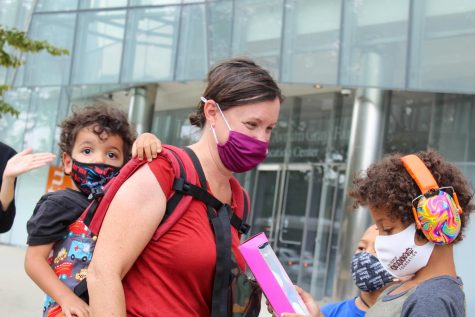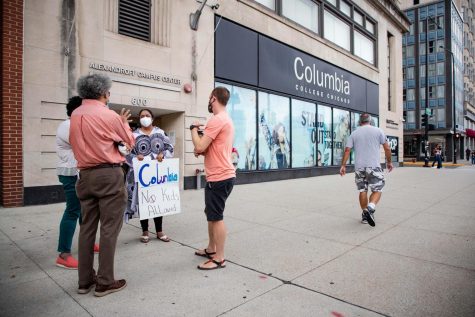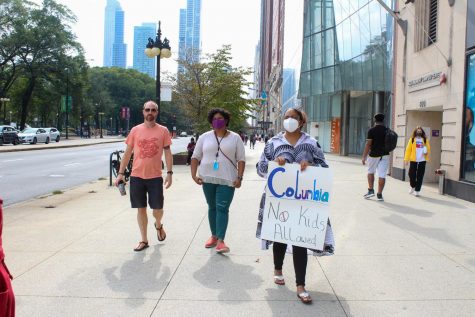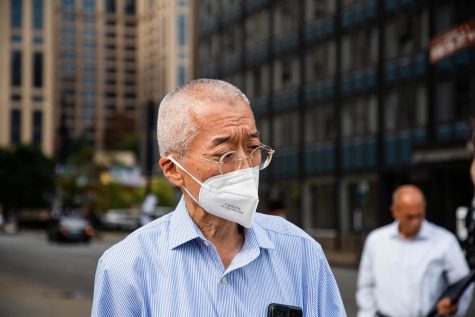Faculty and staff rally against new children on campus policy; President Kim responds
October 11, 2021

On Monday, members of the Columbia faculty and staff banded together outside the 600 S. Michigan Ave. building to rally against the college’s recent decision to require approval for children to be on campus.
Around 15 protesters attended the rally; some held homemade signs while others stood peacefully on the sidewalk discussing the topic with their peers.
Toward the end of the rally, Columbia President and CEO Kwang-Wu Kim, along with Michael Joseph, vice president of Enrollment Management, walked past some demonstrators but did not acknowledge them.
After being stopped by a Chronicle reporter, Kim explained that the new policy is an extension of Columbia’s existing visitors policy.
“Right now while we’re in a pandemic, which we’re very much in the middle of, we cannot have people who are not vaccinated or tested on campus, we just can’t,” Kim said.

“I wonder if there’s a little bit of just misunderstanding of intent,” Kim said. “In order to reopen the campus this fall, there were a lot of people that really needed to know that the college had gone out of its way to try to guarantee safety.”
While Kim hopes the new policy will enforce the idea that Columbia is a safe place, Faculty Senate President Madhurima Chakraborty believes it will negatively affect the college’s reputation instead.
“We don’t want to give the impression that we are a college that doesn’t see the diverse family contexts that are actually here,” said Chakraborty, who is also associate chair in the English and Creative Writing Department. “[That is] probably a pretty terrible thing for us.”
Kim said he saw the latest statement on children on campus as “an extension of our visitors policy.” He later said, “We never articulated where children fit into that policy.”

Kim also said staff and faculty have had different experiences regarding bringing their children on campus.
“It’s never been an option for a staff member to bring a child on campus because it doesn’t work with their work,” Kim said.
When Jennifer Halperin, a staff member who works as an internship and career adviser at the college’s Career Center, started working at Columbia in 2007, she was a single mom with four children under age 12. She said she rarely brought her children to campus and when she did it was in an “emergency situation.”
But Halperin added: “Just knowing that I had the flexibility to do so probably enabled me to work at Columbia better for students and alumni. It allowed me to put all my energy into finding internships for students and helping alumni find jobs.”

When Kim was presented with the argument from staff and faculty saying they may need to bring their children to campus in an emergency, he reiterated that members of the Columbia community “can’t bring someone on campus just because [they] want to.”
In the future, both the college’s administration and Faculty Senate hope to continue the dialogue around the new policy.
“The provost is convening a group of faculty, staff and students to talk about what could a more comprehensive approach to child care looks like,” Kim said. “So I think a lot of things will flow out of that conversation.”
Chakraborty said she too is looking forward to an advanced dialogue toward a solution.
“What we’re hoping to have is not actually anything too radical,” Chakraborty said. “What we’re hoping for is a conversation that takes into account many different voices on campus.”







